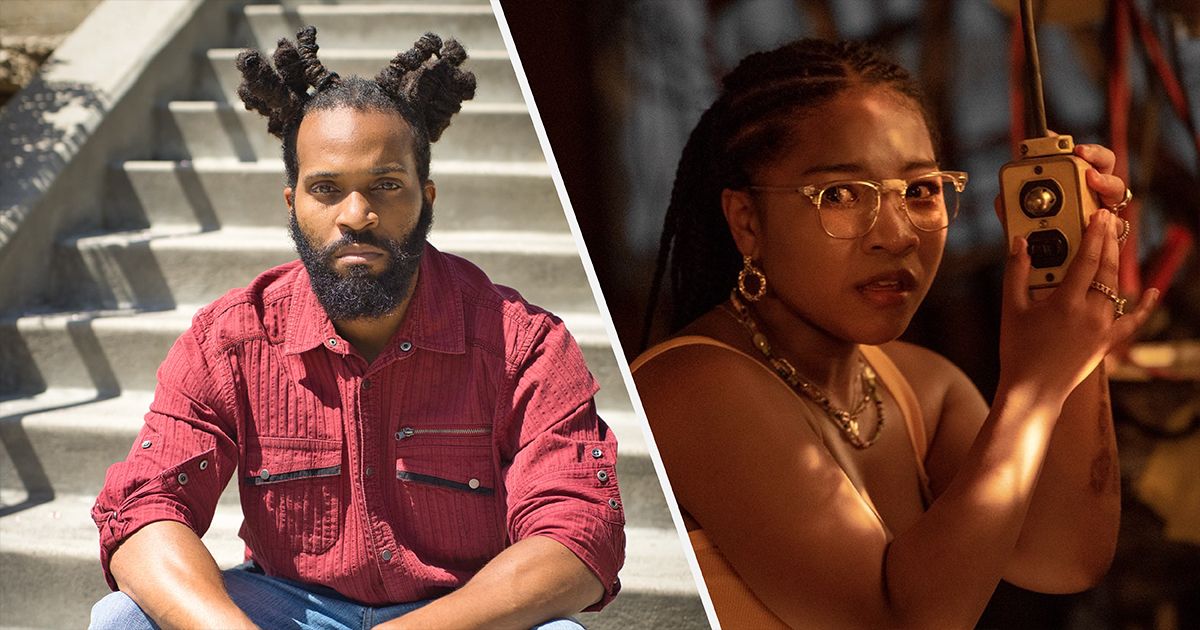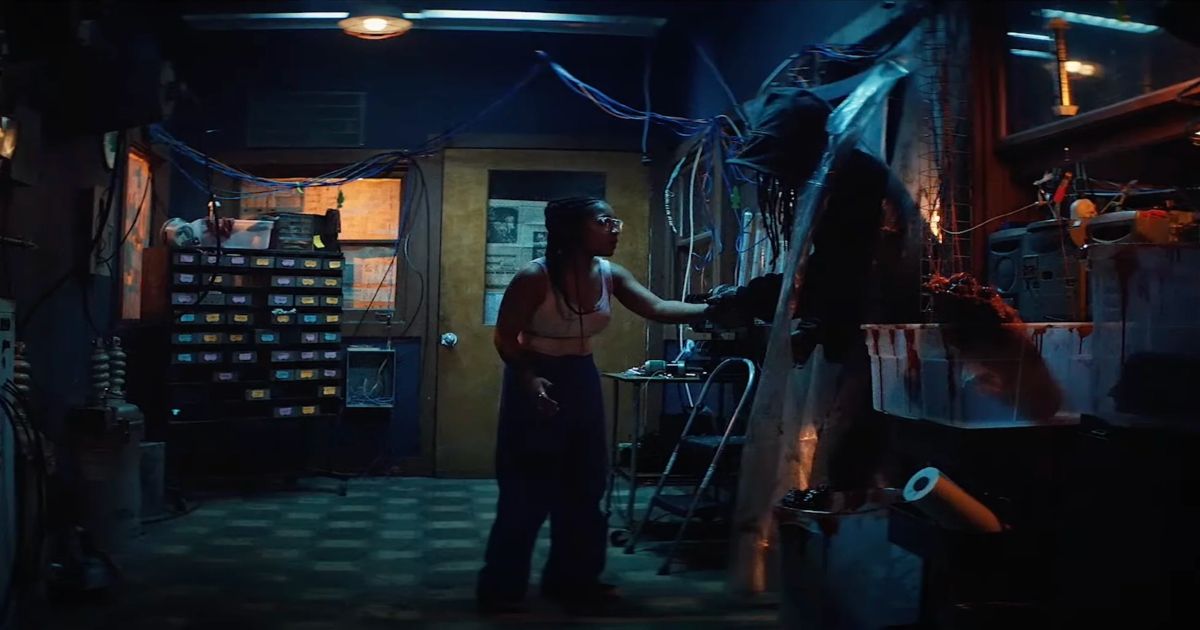All men hate the wretched; how, then, must I be hated, who am miserable beyond all living things! Yet you, my creator, detest and spurn me, thy creature, to whom thou art bound by ties only dissoluble by the annihilation of one of us. You purpose to kill me. How dare you sport thus with life? Do your duty towards me, and I will do mine towards you and the rest of mankind. If you will comply with my conditions, I will leave them and you at peace; but if you refuse, I will glut the maw of death, until it be satiated with the blood of your remaining friends.
That’s Mary Shelley, writing in 1818’s Frankenstein, the classic tale of a mad scientist playing God by resurrecting the dead to disastrous results. The quote has a very particular thematic resonance in the new horror film, The Angry Black Girl and Her Monster, a very loose adaptation of the Shelley text from writer/director Bomani J. Story. The film asks a potent question — if you treat someone like monster long enough, will they become one? What do we owe each other, and how much effect do systemic problems actually have? Does a historically racist and classist system create so-called monsters? How much hatred breeds hatred?
Laya DeLeon Hayes stars as Vicaria, the titular ‘Black girl’ who is a child prodigy of sorts living a very hard life. Her mother is dead, and her brother has recently been murdered; her father is a drug user, and her community is infested with drugs; the authority figures at school disrespect her and treat her like a common criminal despite Vicaria being smarter than anyone else around. In a bit of mad science, the ingenious girl resurrects her dead brother, but loses control of his violent impulses which will soon wreak havoc on everyone in her orbit. Hayes and Story spoke with MovieWeb about the film.
Bomani J. Story Resurrects Frankenstein
Frankenstein has a universality to it which makes it adaptable in almost any setting imaginable. Flesh for Frankenstein, Abbott and Costello Meet Frankenstein, Depraved, Frankenweenie, May — there have been many masterful movies which take the template and contextually adjust it for different genres or allegorical meaning. The Angry Black Girl and Her Monster is the most recent addition, and it’s a good one.
“I had never read Frankenstein before even hearing about this movie,” confessed Hayes. “I never read it in school, but just to be able to take a classic tale and put a very modern twist on it and put a lead Black girl in the middle of that was very fascinating and fresh to me, and something that I wanted to dive into.”
Hayes’ titular character, Vicaria, is an urban avatar for Victor Frankenstein, and exhibits a similar grief, genius, and madness, but one that’s been transported to a public housing community. “When I read the book, I was fresh out of high school, and it just gave me anxiety,” explained Story. “First of all, it’s an incredible book, but just looking at the themes of it was very potent to me and my experience moving through this world, as well as some of the people around me. The idea of this monster being dehumanized in all these different ways, it really resonated with me. Not to mention Victor.”
Story elaborated:
One of the things about Victor that people kind of skip over, is at the very beginning of his genesis. He loses his mom and all these people at a very young age, and with the destruction of his family, I was just like — this just makes complete sense to me, because of these systemic pressures that are twisting my community in so many different ways, just like the story. It just made complete sense for it to kind of be told, or at least inspired by and reformatted, for our times, for today.
Deviating from Mary Shelley
The Angry Black Girl and Her Monster is certainly very different from the Frankenstein we’re used to, but it recontextualizes it in elucidating ways, showing how people of color have been dehumanized and marginalized, viewed as monsters, by societal systems for centuries and more. It’s a darkly authentic portrait of a Black community and sociopolitical tragedy, but is surprisingly more emotionally poignant and open than the brilliant but stiff Frankenstein novel.
Bomani J. Story has made an emotive horror film, and while it mucks about with misery, it’s ultimately hopeful about the future for Black communities and marginalized people. Story admitted that the book needed something injected into it for these times and this adaptation — a little hope.
“That was a big deviation,” explained Story, discussing how the film is ultimately hopeful in its more optimistic ending. “I mean, there’s a bunch of deviations from the novel, but like, if you read the original text, you know — spoiler alert — Victor dies. The book’s 100 years old, if you don’t know that, it’s your fault, but like, it ended on a note that just didn’t really feel appropriate for this story. In this story, I don’t feel like Vicaria was coming at this the same way that Victor was coming at this situation, and it just felt more appropriate. I don’t know how else to explain it. Like if we went the way of the novel, it would have felt very dissatisfying, to me, as a story.”
Laya DeLeon Hayes and Victor / Vicaria
Victor Frankenstein gets a vibe check as well, thanks to a multifaceted and powerful performance from Laya DeLeon Hayes, who saw in Vicaria someone often missing from films — a brilliant but realistically flawed Black woman. “Oh, so much interested me about Vicaria. This type of girl is very layered, and she’s not perfect. She has a lot of flaws, as teenagers do. They’re just figuring it out,” explained Hayes. She continued:
The difference with her is, she’s very passionate about that fascination for death, and she’s willing and courageous enough to do as much as she can to cure it. Like, she believes it should be cured. But also on top of that, like Bomani was talking about, so much was stripped away from her at a very young age. I mean, she lost her mother. She’s mourning the recent and sudden death of losing Chris, she’s dealing with that. And on top of that, she’s seeing her dad and how he’s dealing with substance abuse. So there was a lot that I could pull from, a lot that I could play with.
“So again, in the meeting with Bomani, I felt like we were on the same wavelength. So all of that kind of made me want to do the project even more,” continued Hayes. “And it’s a testament to Bomani, he really helped get me into that headspace. And then on top of that, I did my own prep work because I was really fascinated with Vicaria, I would just write as much down as I possibly could about her. And then when we got to set, I think it was like a light switch for me one day, when I was just like, I gotta be present. She already lives inside of me. There’s not too much I have to do or play with. She’s already there.”
Being Black and Brilliant in America
Hayes related to Vicaria, which makes sense; The Angry Black Girl and Her Monster is a deeply empathetic film that invites audiences to insert themselves in the characters’ positions and look at grief, violence, and racism from a new perspective. After all, the name ‘Vicaria’ seems intentionally close to the word ‘vicarious.’
When asked how she sees herself in Vicaria, Hayes said, “The fact that I am a young Black person growing up in this day and age, pretty much. Even relating it back to my family. I mean, just to honestly experience being a Black person in America, you’re stripped away of so much of your humanity. And every single day, like we were also talking about with certain microaggressions, there is certain racism that you face. I can relate to that, and I understand that, and I could see that with Vicaria.” She continued:
But I could also see the teenage girl within her too, someone who’s 17. She’s vulnerable, she’s searching for love, she’s trying to put all the pieces together, she’s searching for family. And in many ways I could relate to that as well, and I think anybody can, anyone who has lived through that. If you’ve experienced any type of thing that Vicaria has, they can look at her and see themselves within her too.
“To piggyback on that,” added Story with a smile, “she can also connect with Vicaria’s brilliance. .I mean she came in and kind of just smacked it out of the park. I woke up the next morning, and I was just like, “Stop casting people. Like, the girl is here, there’s just no point in looking at anyone else.’ Because I don’t see it anywhere else outside of her.”
Black Bodies
Vicaria, like Dr. Victor Frankenstein, is not a downright ‘bad’ person, and the film, like Frankenstein, doesn’t label people as either good or bad. A great father is a drug user; an ingenious girl creates a murderous monster; a violent drug dealer cares about his community. Vicaria is a wonderfully complicated character because she is both good and bad beneath the veneer of a genius and within the core of a deeply wounded person. The community she exists within, and the way she interacts with it, are also representative of that lack of value judgment.
What Vicaria does in that community is interesting. She sees and experiences all the death around her, and she wants to beat it, to cure it, to reverse it. What ends up happening, of course, is violent. The Angry Black Girl and Her Monster frequently reminds viewers about “Black bodies,” and the way they are distorted and broken, even from people to Vicaria.
“I think there’s just a lot of historical relevance to that, and how Black bodies are treated, and I think it’s very sensitive,” explained Story. “I think it was important for Vicaria to be called out on that, because of how our bodies are treated in society and viewed and portrayed and kind of discarded, and again, with the theme of being dehumanized, even after death, I think that it was important for that to be pulled to the carpet, considering what she’s doing. So yeah, that was very important to me to kind of have in there. I don’t feel like you can have a Black character doing these things and have that not be addressed. That would be wrong, especially considering how potent it is in our community, and how and how prevailing it is.”
So no, Victor / Vicaria is no hero. But they have a right to be angry, and by understanding their stories, their grief, and their pain, we may be less inclined to treat people like monsters.
Produced by Crypt TV, RLJE Films released The Angry Black Girl and Her Monster in theaters on June 9, 2023, and it will be on demand and on digital on June 23, 2023. It will also stream on ALLBlk and on Shudder at a later date.
Stay connected with us on social media platform for instant update click here to join our Twitter, & Facebook
We are now on Telegram. Click here to join our channel (@TechiUpdate) and stay updated with the latest Technology headlines.
For all the latest Education News Click Here


